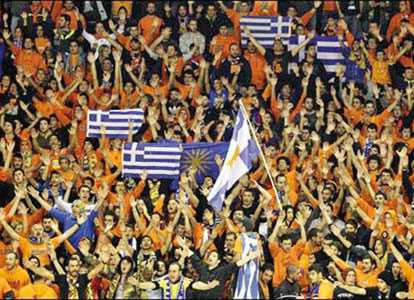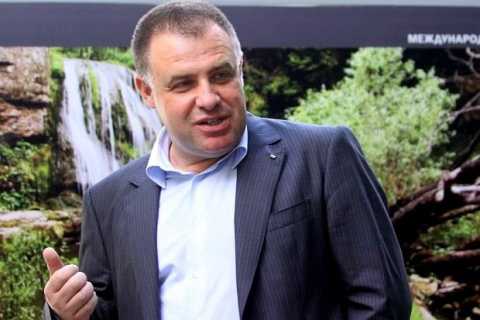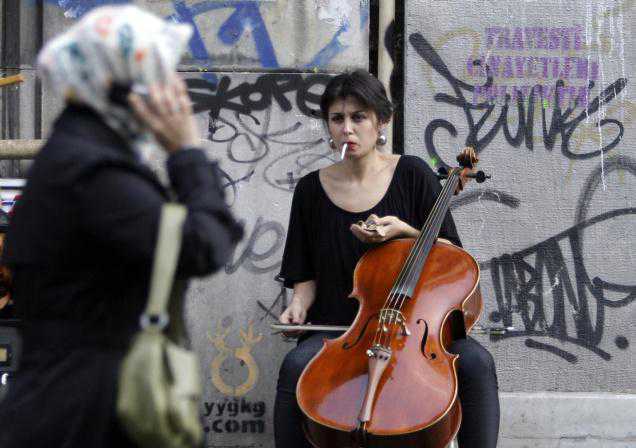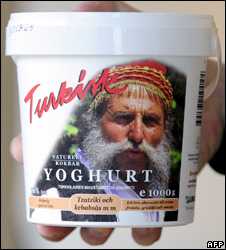FULYA ÖZERKAN
ANKARA – Hürriyet Daily News
Turkey is readying to use legal and political channels to respond to attacks against Turkish basketball players during a match in Greek Cyprus. ‘Our first priority was to ensure the players’ safe return after the attack. That was done and the next step will be to bring the issue onto the international agenda,’ a diplomatic source says

Turkey is poised to take strong legal and political measures in pressing for an international response to an assault Tuesday night on a Turkish basketball squad by home-team fans during a match in Greek Cyprus.
“Our first priority was to ensure the players’ safe return after the attack. That was done and the next step will be to bring the issue onto the international agenda,” a diplomatic source told the Hürriyet Daily News & Economic Review on Thursday.
Turkey will pursue legal channels by sending a letter of complaint to the world basketball governing body, while the government presses the United Nations and the European Union to take action. Ankara holds the U.N. Peacekeeping Force in Cyprus responsible for not taking sufficient security measures.
“We will, of course, complain to the United Nations both in Nicosia and New York because while our team’s initiative to play the match in Greek Cyprus was a [friendly] gesture, our players’ safety was not ensured,” the diplomatic source said. “Because Greek Cyprus is a member of the European Union we will also take initiative at the EU level.”
During a FIBA Eurochallenge game against Apoel in Nicosia on Tuesday night, players on Turkey’s Pınar Karşıyaka were severely attacked by hundreds of Apoel fans who threw objects at the team and charged the court after the match’s final buzzer. The game had no particular importance since both teams’ places in Group G were already certain.
The Turkish basketball players returned home to the Aegean province of İzmir through Greece because Greek Cypriot officials rejected Pınar Karşıyaka’s request to spend the night with security in northern Cyprus. They argued that such a step would be tantamount to recognizing Turkish Cyprus, which is only recognized by Turkey. Greek and Turkish Cypriots have been divided since 1974, when Turkey sent troops into the north after a rebellion by Greek Cypriots who wanted to unify with Greece.
“The Greek Cypriot squad played in a previous match in İzmir, where they were warmly welcomed without encountering any incident. Turkish authorities did not even feel the need to take any extra security measures,” one source familiar with the developments told the Daily News.
“Our players thought they would be treated the same and in return decided to play the match in Greek Cyprus but what was expected did not happen,” the source added.
Immediately following the incident, Turkish Foreign Minister Ahmet Davutoğlu held a telephone conversation with Kaya Türkmen, the country’s ambassador to northern Cyprus. Embassy officials contacted by the Daily News said Türkmen would be unable to comment due to his busy schedule.
Turkey will track the issue, says FM
In Istanbul, Davutoğlu said Thursday that necessary security measures were not taken. “This is not an excusable situation, and we will keep track of the issue,” he told a group of journalists in Istanbul’s Çırağan Palace, where he was attending the 11th summit of the Economic Cooperation Organization.
The Turkish foreign minister also said statements of apology made by Greek Cypriot authorities immediately after the attack were not sufficient, and emphasized that brotherhood and peace must prevail in sports events.
In initial remarks, Greek Cypriot President Dimitris Christofias slammed those involved in the assault as “brainless,” saying their actions harmed the interests of the Greek Cypriot side.
“This has caused big problems for the Republic of Cyprus because this gives great fuel to Turkish propaganda,” he was quoted as saying.
* Daily News reporter Erisa Dautaj Şenerdem contributed to this report from Istanbul.
Hürriyet Daily News







 Wednesday, August 5, 2009
Wednesday, August 5, 2009